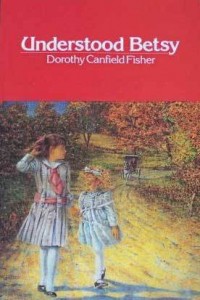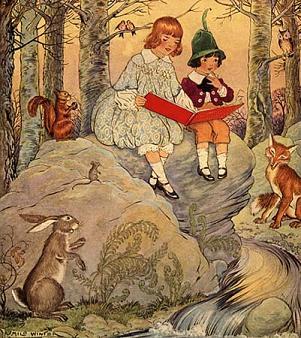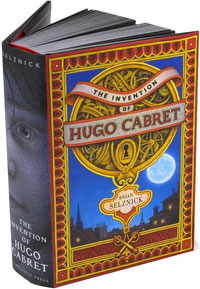Understood Betsy
 We finished Dorothy Canfield Fisher’s Understood Betsy (1916), our most recent chapter-book read-aloud. It’s a rich book that gave mother and daughters alike much to think about.
We finished Dorothy Canfield Fisher’s Understood Betsy (1916), our most recent chapter-book read-aloud. It’s a rich book that gave mother and daughters alike much to think about.
The title character begins the book as “Elizabeth Ann” and grows into “Betsy” as the novel progresses. It’s fitting that her moniker changes, given the significant changes she undergoes herself. As the story opens, she is an orphan being reared by her urban, fragile, helpless Aunt Frances. Treated as a breakable and unusual object, she is on her way to becoming a miniature version of her aunt. But when Frances must move temporarily to care for her sick mother, Elizabeth Ann is sent to live with her cousins the Putneys on their Vermont farm. Aunt Frances has made no secret of her opinion that the Putneys are extaordinarily backward and untrustworthy as guardians, and she makes other arrangements for her niece. But circumstances intervene to necessitate Elizabeth Ann’s stay with them, and so her adventures begin.
One of the story’s themes is strength and resourcefulness. The Putneys treat Betsy as someone with common sense, and therefore she becomes such a person. Their attitude toward her is much more hands-off than Aunt Frances’ was, so she comes into a sense of her own preferences and abilities through being given freedom and responsibility.
I have already made an effort to give my daughters independence, encouraging them to make a real effort to work it out when they have a conflict and giving them responsibilities in their schoolwork and around the house. I let them learn from the consequences. But since we started reading this, I have recognized more often the times I simply nag them, and I’ve found myself consciously thinking, “Let them be.”
In several episodes, Betsy needs every ounce of her newfound ingenuity to get out of one scrape or another. But I appreciated the way the story values her personal strength only in a context of care and love by her relatives. Part of Betsy’s courage to develop is the nourishing atmosphere of relationships. The importance of love and friendship, and of compassion toward others, are reinforced over and over. Independence in this tale has more to do with self-initiated action and good judgment than with “going it alone.”
Finally, this is a story about the need for worthy role models. Aunt Frances is a caring, but essentially merely decorative, lady. Cousin Ann Putney is practical, capable, and wise. Betsy prizes her good opinion and begins to emulate her. This turns out very well for Betsy, and it makes me all the more thankful for the people in my children’s lives who model a similar uncompromising character and range of abilities.
My complaints are restricted to the physical book, which was totally without illustrations, and riddled with typos. It’s not the pictured book above, but the title link takes you to the version we (unfortunately) purchased. Avoid that version, but by all means read the book — especially if you have daughters in the 8-10 year old range, but for your own enjoyment as well.


